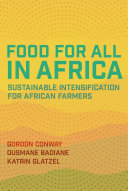

Most ebook files are in PDF format, so you can easily read them using various software such as Foxit Reader or directly on the Google Chrome browser.
Some ebook files are released by publishers in other formats such as .awz, .mobi, .epub, .fb2, etc. You may need to install specific software to read these formats on mobile/PC, such as Calibre.
Please read the tutorial at this link: https://ebookbell.com/faq
We offer FREE conversion to the popular formats you request; however, this may take some time. Therefore, right after payment, please email us, and we will try to provide the service as quickly as possible.
For some exceptional file formats or broken links (if any), please refrain from opening any disputes. Instead, email us first, and we will try to assist within a maximum of 6 hours.
EbookBell Team

4.1
10 reviewsAfrica requires a new agricultural transformation that is appropriate for Africa, that recognizes the continent's diverse environments and climates, and that takes into account its histories and cultures while benefiting rural smallholder farmers and their families.
In this boldly optimistic book, Sir Gordon Conway, Ousmane Badiane, and Katrin Glatzel describe the key challenges faced by Africa's smallholder farmers and present the concepts and practices of Sustainable Intensification (SI) as opportunities to sustainably transform Africa's agriculture sector and the livelihoods of millions of smallholders. The way forward, they write, will be an agriculture sector deeply rooted within SI: producing more with less, using fertilizers and pesticides more prudently, adapting to climate change, improving natural capital, adopting new technologies, and building resilience at every stage of the agriculture value chain.
Food for All in Africa envisions a virtuous circle generated through agricultural development rooted in SI that results in greater yields, healthier diets, improved livelihoods for farmers, and sustainable economic opportunities for the rural poor that in turn generate further investment. It describes the benefits of digital technologies for farmers and the challenges of transforming African agricultural policies and creating effective and inspiring leadership.
Food for All in Africa demonstrates why we should take on the challenge and provides ideas and methods through which it can be met.